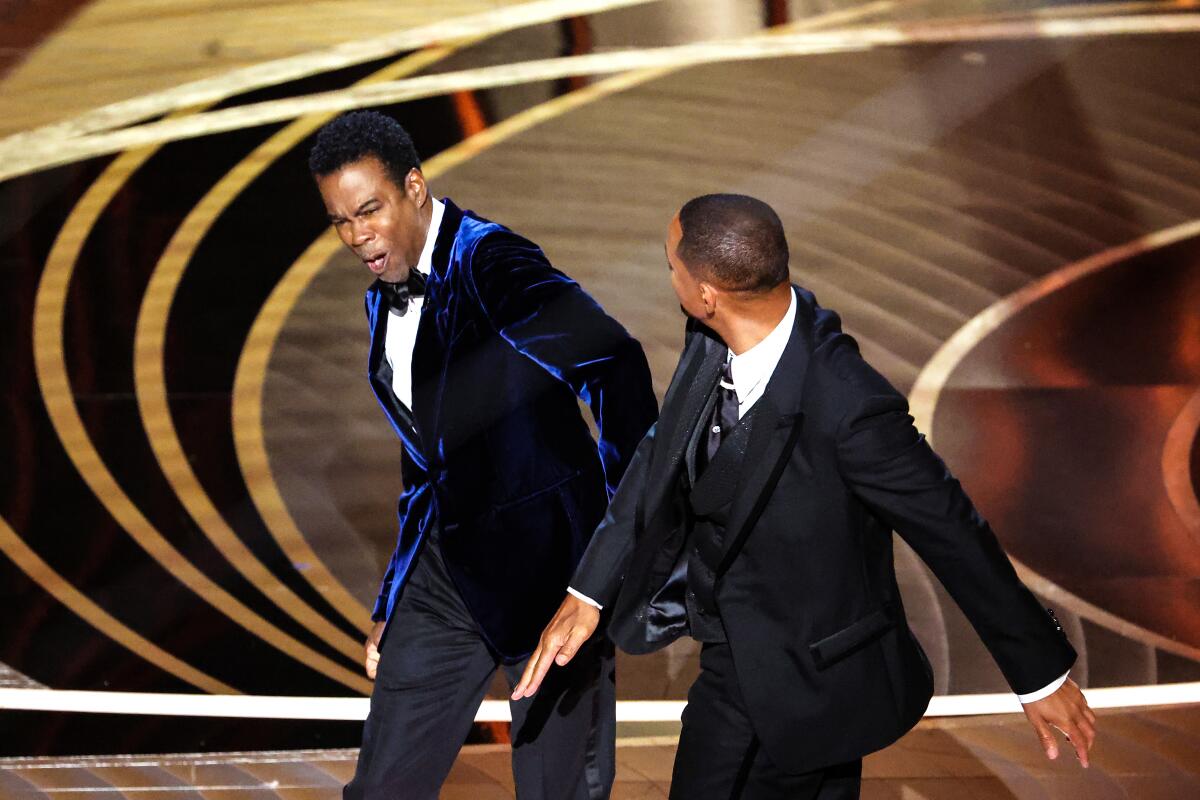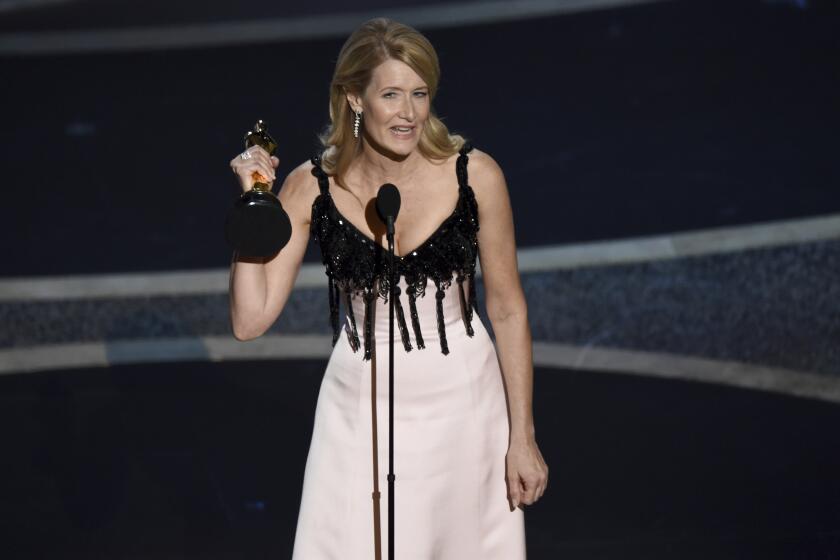Will Smith’s slap snaps the Oscars out of its ratings tailspin

Will Smith’s stunning onstage slap of Chris Rock at the Oscars on Sunday made for one of the most memorable moments in show business history — and likely helped give a ratings boost to ABC’s beleaguered telecast, at least late in the ceremony.
Early Nielsen data showed the telecast averaged 15.4 million viewers, up 56% from last year’s comparable initial figure of 9.85 million (the final number rose to 10.5 million, an all-time low). While it’s a significant improvement, the figure pales compared to the ratings of 2020, when the telecast drew 23.6 million viewers, and ranks as the second lowest ever. The Oscars attracted 33 million viewers as recently as 2017.
But the shocking incident involving Rock and Smith generated a major national conversation and global attention, which may help quell discussions about how the Oscars have ebbed as an important cultural event.
Rock, on stage to present the trophy for best documentary, joked that he was looking forward to seeing Smith’s wife, Jada Pinkett Smith, in a sequel to “G.I. Jane,” a reference to the actress’s close-cropped hair. Smith took to the stage, struck Rock with an open palm, returned to his seat and said loudly, “keep my wife’s name out of your f— mouth.” (In a strange coincidence, “G.I. Jane” was airing opposite the Oscars telecast on BBC America.)
The audio on ABC’s feed went silent through most of the confrontation. But international broadcasters, where standards on acceptable language are less stringent than the U.S., aired the profanity-laced moment uncensored, allowing millions to hear what was said after through clips shared on social media.
Big ratings declines for the Grammys and Golden Globe Awards have the TV industry wondering how low the Oscars could go.
The viral moment likely gave a boost to ABC in the final hour of the broadcast — which included Smith’s tear-filled acceptance speech for winning the best actor trophy for his portrayal of tennis-coach father Richard Williams in “King Richard.”
The event will undoubtably go down in history with other notoriously shocking Oscar moments, such as when Native American Sacheen Littlefeather walked to the stage at Marlon Brando‘s request to reject his best actor trophy for “The Godfather” in 1973, the streaker who crossed the stage behind an unflappable David Niven during the 1974 ceremony and the 2017 snafu in which “La La Land” was mistakenly announced as best picture winner before the award went to “Moonlight.”
Such spontaneously bizarre moments have been few and far between in recent years, as the ceremonies have been lumbering affairs saturated with earnest political statements that have turned off some viewers.
Once the most watched entertainment program of the year, the Oscars’ audience levels have been on a steady downturn in the last few years as streaming fragments the TV audience and consumers can satisfy their fix for celebrity glamour all year round through social media. The academy’s penchant for ignoring commercial box office hits has also diminished the show’s popularity and has begun to cast doubt on whether the awards matter to the public.
The pandemic hastened the Oscars’ ratings decline last year — along with other major awards shows — as health protocols led to a scaled down ceremony.
The American public’s connection with the moviegoing experience has also eroded during the health crisis. A Gallup poll earlier this year found 61% of U.S. residents did not set foot in a movie theater in 2021. The last time Gallup asked the question — in 2007 — the figure was 31%.
But the onstage drama involving Smith and Rock, combined with a ceremony that was not constrained by remote acceptance speeches and other health protocols likely helped the numbers bounce back.
The academy, which gets in excess of $100 million annually from ABC for the broadcast rights to the Oscars telecast, attempted to streamline this year’s ceremony by pre-taping and editing the acceptances speeches of the winners in several of the below-the-line technical categories.
The program — in an acknowledgement that the nominees were not brimming with broad-appeal crowd-pleasers — also tried to satisfy legacy film fans by reuniting casts of iconic films including “The Godfather,” “Pulp Fiction” and “White Men Can’t Jump.”
The ceremony at the Dolby Theater, hosted by Amy Schumer, Wanda Sykes and Regina Hall, did have some emotional moments thanks to its best picture winner “CODA,” the hear-tugging drama about a hearing teenager growing up within a Deaf family.
“CODA” co-star Troy Kotsur became the second Deaf actor to win an Oscar. He was honored in the supporting actor category.
Along with Kotsur and Smith, other major winners included Jessica Chastain, who earned a best actress trophy for her portrayal of televangelist Tammy Faye Baker in “The Eyes of Tammy Faye,” and Ariana DeBose, honored as supporting actress for playing Anita in “West Side Story.”
Jane Campion won the directing award for her work on “The Power of the Dog,” her second award and first in the category.
More to Read
Inside the business of entertainment
The Wide Shot brings you news, analysis and insights on everything from streaming wars to production — and what it all means for the future.
You may occasionally receive promotional content from the Los Angeles Times.












